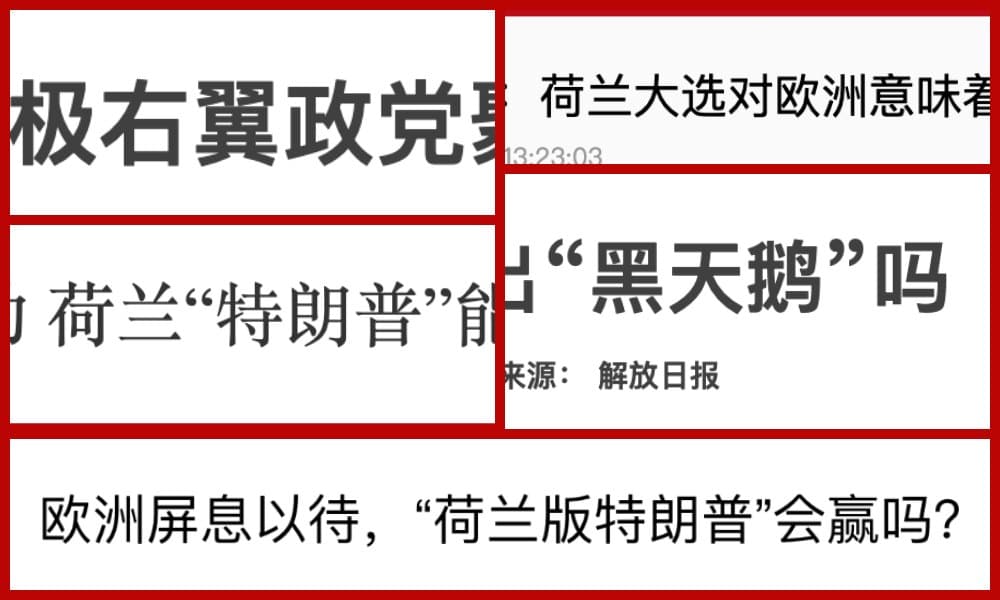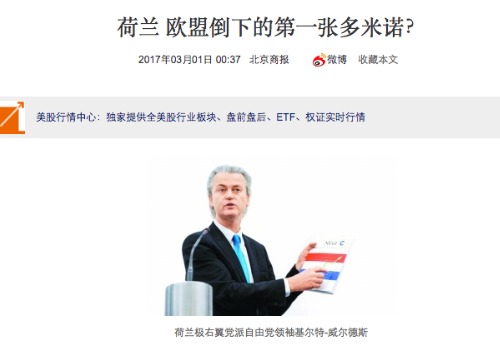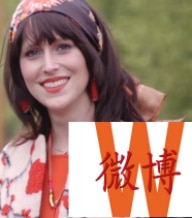China Media
Following the Elections in the West – Chinese Reactions on Wilders and “The Rise of the Right”
Weibo users are closely following the new political trends in the West, with a recent focus on populist Dutch politician Geert Wilders.
Published
7 years agoon

With Trump as the new US president, and popularity of right-wing politicians rising in the Netherlands, France, and Germany, Weibo users are now following the new political trends in the West with a recent focus on populist Dutch politician Geert Wilders. While Chinese state media write about the dangers of the “rise of the right,” many Chinese netizens express their appreciation of Wilders.
On Weibo, the topic ‘following the elections in the West’ has recently become increasingly popular. “The American elections have ended, and Trump is now running the country via Twitter. The French and German elections are coming up next,” – an account named “Following The Elections in the West” (hashtag: #关注西方大选#) says.
Besides the elections in Germany and France, the Dutch elections are also a topic of discussion. Dutch politician Wilders, called Wéi’ěrdésī (维尔德斯 or 威尔德斯) in Chinese, has become a recurring subject in the Chinese media, that represent the results of the Dutch elections as the precursor for the other elections of Continental Europe.
Geert Wilders is the leader of the Dutch right-wing Freedom Party (PVV), which is expected to win many votes in the upcoming elections in the Netherlands. With his plans to “de-Islamize” the Netherlands and his anti-EU and anti-establishment stance, Wilders is winning over voters who feel alienated from the ruling political class.
ALL EYES ON EUROPE
“This Dutch man, who is crazier than Trump, wants to change Europe.”
“Why do we need to closely follow the Dutch elections?”, one Shanghai media source recently wrote on Weibo: “Because after the shock of the 2016 Trump election and Brexit, all eyes are now on Europe. And on the one hand we have Le Pen (勒庞), the leader of the right-wing National Front (FN), and on the other hand, we are now approaching the Dutch elections where we have the Dutch right-wing party of Wilders, who just might become the next prime minister.”
The heightened media attention for European politics with a current focus on the Netherlands and Wilders is noticeable in Chinese state media, with official media such as Global Times and Xinhua writing about it.
In late February, Chinese state tabloid Global Times featured a column about Wilders, which was also shared on Chinese social media platforms Weibo, Baidu forum, and on WeChat. It is titled: “This Dutch man, who is crazier than Trump, wants to change Europe” (这个比特朗普还要疯的荷兰人要让欧洲变天了).
“These days, the whole western world is focused on the Netherlands like never before,” the article starts: “Because within a month the big elections will take place and the potential big winner is an unusual political party that opposes practically everything that mainstream European thinking stands for.”

Photo (size adjusted) by David Sedlecký.
The article quotes Wilders in saying: “The Islam is not a religion – it is an ideology that has sprung from a backward culture. And this ideology might be scarier than Nazism, as the Koran is even more violent and more anti-semitic than Mein Kampf , and it needs to be shut out.”
STRONG ANTI-ISLAM STANCE
“If Wilders’ Freedom Party really wins the Dutch elections it will be a worse nightmare for the EU and Europe than Brexit was.”
The Global Times article argues that if Wilders’ Freedom Party really wins the Dutch elections, “it will be a worse nightmare for the EU and Europe than Brexit was.”
One of the reasons mentioned why it would be “nightmarish” for Wilders to win, is because of the Freedom Party’s strong anti-Islam stance and its proposals to shut down mosques and stop serving halal food in the canteens of Dutch schools.
The Global Times explains this by writing: “They think that Islam is the greatest threat to Western civilization. [They think that] If you let Islam take root in Western countries, then Europe will be Islamized decades later, and Western civilization will be completely destroyed.”
The article continues: “Of course, their stance has greatly angered followers of Islam all across Europe, but when these religious people fight back, they actually precisely do what the Freedom Party expects. Like in 2009, when Geert Wilders came to England for an interview and over 40 Islamic people went to the streets carrying banners that said that ‘Islam will dominate the world.'”
Muslim protesters in Holland hold up ‘Islam will dominate the world’ signs & ‘Sharia for the Netherlands’ https://t.co/F8O9iYwjSC pic.twitter.com/t0yNKYxaGB
— rodriQuez (@rodriQuez) March 12, 2017
Tweet above: the image as used in the Global Times when mentioning the protest by Muslims outside Geert Wilders press conference in central London in October 2009.[/caption]
The article argues that Wilders “represents himself” as a “victim of Islamic violence” – as he cannot leave his house without bodyguards by his side – but that his provocative way of speaking has also led to him facing legal actions within the Netherlands. He was found guilty of inciting discrimination when he asked a roomful of Freedom Party supporters if they wanted to have “more or fewer Moroccans” in the country.
RISE OF THE RIGHT
“The Dutch Freedom Party is not alone, but is part of the rise of other far-right political parties across Europe: this is their year of patriotism.”
Besides his strong anti-Islam stance, another reason why the article says a win by Wilders would be disastrous to Europe, is because of his anti-EU position. This stance comes from the belief that the corrupt nature of the EU organizational structure and the incompetence of the ruling authorities in Brussels have led to the immigration crisis and the financial crisis in Europe.
The column points out that the Freedom Party has greatly gained in popularity in the Netherlands since its establishment in 2006. The Greek debt crisis, the refugee crisis, as well as last year’s Brexit and the election of Trump, have all contributed to its popularity.
The Global Times finally argues that the Dutch Freedom Party is not alone, but is part of the rise of other far-right political parties across Europe, such as the National Front in France. “This is their year of patriotism,” they write.
"2017, j'en suis sûre, sera l'année du réveil des peuples de l'Europe continentale !" #Koblenz pic.twitter.com/q85iyBNzLV
— Marine Le Pen (@MLP_officiel) January 21, 2017
Embedded tweet: Geert Wilders, left, Frauke Petry, Harald Vilimsky, Marine Le Pen and Matteo Salvini at a meeting in 2017.
“The current mainstream media are worried and anxious about the rise of the right-wing forces, but they can only pray that the Europeans won’t be as stupid as the Americans,” the column concludes, also adding: “We the Chinese people just want to say that whatever American, UK, or even French, German, Dutch, or Russian drama, etc., there is, let’s not make this a drama that includes China.”
THE WILDERS EFFECT
“It is relevant to note that the Netherlands can be regarded as the leader of European political trends.”
Besides Global Times, Chinese media outlets Xinhua News and Sina recently also wrote about Wilders. China’s Sina News published an article on March 1st titled “Is Holland the first domino stone to collapse on the European continent?” (荷兰 欧盟倒下的第一张多米诺), and Xinhua‘s article is titled “The Dutch elections are nearing, will populism win?” (荷兰大选在即,民粹主义会得势吗).

Sina News (March 1st): “Will Holland be the first domino stone falling on the European continent?”
Both articles suggest that parties such as the Freedom Party win support because of their anti-immigration and anti-EU tendencies, but that voters of Wilders do not necessarily want him to actually lead the country: “People may vote for Wilders as a protest vote,” they write.
They emphasize the role of the Netherlands on the European continent: “It is relevant to note that the Netherlands can be regarded as the leader of European political trends,” Sina News says, looking back at political trends in the 1960s and 1990s.
Xinhua also brings up the so-called ‘Wilders Effect’ (威尔德斯效应). The ‘Wilders Effect’, also mentioned by Tom-Jan Meeus on Politico.eu, implies that the harsher Wilders is criticized (e.g. by the mainstream media or ruling politicians), the better his chances of winning are.
Even if Wilders comes out as the big winner in the upcoming elections, the chances of him forming a governing coalition are slim as few other parties are willing to govern alongside Wilders after the elections. However, it is precisely the rejection of Wilders that testifies to his accusations that “the political elites disregard the will of the people.”
Although Chinese state media emphasize the dangers of Wilders’ popularity and “the rise of the right,” Chinese responses on Weibo and other social media platforms reveal that many netizens seemingly support the far-right Dutch politician.
CHINESE NETIZENS RESPOND
“Supporters of Islam need to reflect on why it is that all over the world in developed nations people like Trump are receiving the support of the people.”
On Weibo, one Chinese blogger recently wrote about Wilders: “The populist Geert Wilders promises (..) to make the Netherlands ‘great again.’ His ‘Freedom Party’ (自由党) might win more seats than ever before. He is often called the “Dutch Trump”, as he is just as opposed to muslim immigration as the new American president. He also has no trust in the media and loves to send out tweets.”
The post continues: “This ‘Dutch Trump’ wants no more acceptance of immigrants or refugees from muslim countries, as Holland is becoming ‘Islamized’, [he wants to] prohibit the wearing of Islamic headscarves in public places (..), to let the Koran classify as a banned book, a closure of mosques and Islamic schools, the Netherlands should get out of the EU, criminals with a dual citizenship have to be deported, income taxes have to be reduced, people should receive pension at 65 (..).”
In response to this post and the state media articles, many netizens write that they agree with Wilders’ ideas about Islam and that it can be viewed as an ideology, saying: “Isn’t he right about this?”
One Weibo user (@乡梦天地) writes: “Is Islam still a ‘religion’? Perhaps it has deteriorated and has become an ideology that serves a religion. In a normal country, religion is often used as a way to serve the ruling class. But now, it seems that the ruling class is serving religion instead.”
Other Chinese commenters say that “the religion of Islam is an obstruction to the development of society.”
“I have been to Holland and the streets are very ‘green'”, one person says (‘green’ being slang to refer to ‘islam’). “Europe has reached a crucial moment of life or death, turning right is a final opportunity to save themselves,” one commenter (@传捷天下) writes.
We need to save our Western civilization.
There is only one way.
No more Islam.#deislamize pic.twitter.com/RznKmpPcKk
— Geert Wilders (@geertwilderspvv) May 14, 2016
Embedded: Wilders cartoon (same image republished in Global Times).
“Supporters of Islam need to reflect on why it is that all over the world in developed nations people like Trump are receiving the support of the people,” another person responds.
Several netizens say: “There is nothing wrong (没毛病) with what [Wilders] says, it is the truth.”
One person even says: “It would be a blessing for the Netherlands if he were to be elected.”
People responding to the post on Weibo say they look forward to him winning the elections: “I support Wilders becoming the prime minister of Holland!”, one Guangdong-based English tutor writes.
WHAT’S THE FUSS?
“Europe is like a domino game. When one right-wing party comes up, others will follow. When one country leaves the EU, others will also leave the EU.”
But there are also netizens who worry about the rise in popularity of politicians such as Wilders: “Hasn’t the rise of populism already entered a point of no return?”
Like the Global Times column, they also see the rise of right-wing parties as a global trend rather than a European one (“全球右转是个趋势”). Some of them write that “the rise of the right” is a “dangerous trend.”
One France-based Weibo user (@欧洲行-私人订制) writes: “Europe is like a domino game. When one right-wing party comes up, others will follow. When one country leaves the EU, others will also leave the EU.”
But precisely this anti-EU stance is what many other netizens also appreciate in Wilders. When Wilders announced that a Dutch ‘Nexit’ referendum would follow after the Brexit, some Weibo commenters said: “Getting out of the EU might be the only way to save yourself,” although others said that organizing a referendum over such a crucial issue is “much too risky.”
There are also many commenters who do not understand what the fuss is all about: “Holland is such a small country,” a Baidu user writes. One Weibo commenter (@TOAac) also says: “So what, Holland? What will happen in Germany and France is what really matters.”
According to the latest polls, Geert Wilders has now fallen behind the conservative VVD party of Prime Minister Mark Rutte for the first time since November 2016. But until the results come out of the Dutch elections of March 15, nothing is sure.
“In the end, this all is a choice that has to be made by the Dutch voters,” one Baidu netizen concludes.
– By Manya Koetse
Follow @WhatsOnWeibo
Chinese (state) media about Wilders:
Global Times (环球时报). 2017. “这个比特朗普还要疯的荷兰人要让欧洲变天了 [This Dutch Man Crazier Than Trump Wants To Change Europe]” (In Chinese). Global Times, February 21 http://global.sina.cn/szzx/article/20170221/00bf33efd2851000.html [2.3.17].
Sina News (新浪). 2017. “荷兰 欧盟倒下的第一张多米诺 [Is Holland the first domino stone to collapse on the European continent?]” (In Chinese). Sina News, March 1 http://finance.sina.com.cn/stock/usstock/c/2017-03-01/doc-ifyavwcv9263847.shtml [2.3.17].
Xinhua (新华). 2017. “荷兰大选在即,民粹主义会得势吗? [The Dutch Elections Are Nearing, Will Populism Win Power?]” (In Chinese). Xinhuanet.com, February 16 http://news.xinhuanet.com/world/2017-02/16/c_129481542.htm [2.3.17].
Spotted a mistake or want to add something? Please let us know in comments below or email us.

Directly support Manya Koetse. By supporting this author you make future articles possible and help the maintenance and independence of this site. Donate directly through Paypal here. Also check out the What’s on Weibo donations page for donations through creditcard & WeChat and for more information.
©2017 Whatsonweibo. All rights reserved. Do not reproduce our content without permission – you can contact us at info@whatsonweibo.com.
Manya Koetse is the founder and editor-in-chief of whatsonweibo.com. She is a writer, public speaker, and researcher (Sinologist, MPhil) on social trends, digital developments, and new media in an ever-changing China, with a focus on Chinese society, pop culture, and gender issues. She shares her love for hotpot on hotpotambassador.com. Contact at manya@whatsonweibo.com, or follow on Twitter.

China Media
A Triumph for “Comrade Trump”: Chinese Social Media Reactions to Trump Rally Shooting
Chinese commenters discuss how the bullet aimed at Trump has turned into a moment of triumph.
Published
2 weeks agoon
July 14, 2024
The assassination attempt on former US President Trump at a Pennsylvania campaign event has become a major topic on Chinese social media, where Trump’s swift reaction and defiant gesture after the shooting have not only sparked discussions but also fueled the “Comrade Trump” meme machine.
The chaos that erupted when former US President Trump was injured—a bullet grazing his ear—in an assassination attempt at a Pennsylvania campaign event has become a top trending topic on Chinese social media today.
Trump sustained minor injuries, and the moment he raised his arm to cheer shortly before being evacuated from the stage has already become iconic, captured in widely circulated photographs.
Shortly after the shooting, a shooter armed with a rifle was killed by a US Secret Service counter sniper. The FBI identified the shooter as Thomas Matthew Crooks, a 20-year-old local.
The incident, which occurred on the afternoon of July 13th US local time, resulted in one audience member killed and two others critically injured.
“The campaign efforts will be as smooth as a flying bullet”
On Chinese social media platform Weibo, there are multiple trending hashtags related to the incident, such as “Trump Was Shot” (#特朗普遭遇枪击#, 370 million views); “Trump Says Bullet Pierced His Right Ear” (#特朗普称右耳被子弹击穿#, 440 million views); “Reporter Captures Bullet Grazing Trump’s Ear” (#记者拍到子弹划过特朗普耳朵画面#, 60 million); “Identity of Trump Shooter Confirmed” #枪击特朗普枪手身份确认#, 80 million views). By Sunday afternoon, China local time, half of the top ten hot search topics on Weibo were related to the Trump rally shooting.
“Today, the entire world is watching Trump,” one Chinese Weibo blogger wrote (@乐卡数码).
Political and social commentator Hu Xijin (@胡锡进) reposted a tweet from X by American media influencer Jackson Hinkle, comparing a photo of Trump raising a clenched fist after the shooting to Biden on the ground after falling off his bike near his Delaware home two years ago.
Hu Xijin wrote: “The bullet’s trajectory is so clear, just like how the campaign efforts will now be as fast [smooth] as the flying bullet,” (“好清晰的弹道,和与子弹飞得一样快的助选”).

Post by Hu Xijin
Before this, Hu also commented: “Trump was shot in the ear. This news has shocked everyone. My first reaction after waking up to this news was, ‘how could this happen?’ and I instinctively believe that this incident will garner Trump a lot of sympathy, bringing him one step closer to returning to the White House.”
Media commentator “Media Backpacker” (@媒体背包客) commented on Trump’s quick reaction, noting how he swiftly ducked under the podium after the first shots were fired.
“Several Secret Service agents rushed forward, using their bodies as shields,” he wrote. “Just this scene alone seemed much more professional compared to the attack on Shinzo Abe.” Former Japanese prime minister Shinzo Abe was shot and killed during a campaign event in the city of Nara, Japan, in 2022.
‘Media Backpacker’ also commented: “The person most harmed by Trump getting injured is not Trump himself, but his opponent, Biden.” Many other Weibo commenters also suggested that this dramatic event is rapidly shifting American voter support toward Trump.
“Just based on his quick reaction and how quickly he crouched, I’d vote Trump. If it were Biden, he probably wouldn’t have been able to crouch at all,” one top commenter on Weibo said.
Another commenter dismissed any rumors of the incident being staged: “It’s impossible to stage this; don’t mythologize the sniper. It’s not that precise. A bullet grazing the ear is extremely, extremely, extremely dangerous. No one would risk their life like that.”
Overall, commenters on Chinese social media suggested that the incident will boost Trump’s popularity and solidify his position in the presidential campaign.
On Sunday afternoon, China local time, official channels reported that Xi Jinping has expressed his sympathies to Trump following the shooting incident in Pennsylvania. China’s Foreign Ministry has also addressed the attempted assassination, expressing concern (#习主席已向特朗普表达慰问#).
“From a journalistic perspective, this is the perfect photo”
Besides online discussions on Trump’s quick reaction and the political implications, there’s a lot of interest in the iconic photo of Trump raising his fist, captured by Evan Vucci, who previously won the Pulitzer Prize for Breaking News Photography for his coverage of George Floyd protests.
Some netizens noticed that sellers on several Chinese e-commerce platforms soon started selling T-shirts featuring the now famous photo of the incident, priced between 20-49 yuan ($3-$7). Some stores displayed that they had already sold over 10 items, but this merchandise was soon taken offline in various places.


“From a journalistic perspective, this is the perfect photo,” the well-known knowledge blogger Pingyuan Gongzi Zhao Sheng (@平原公子赵胜) wrote: “The destined son of America facing life-threatening danger, his face smeared with blood, with a clenched fist, roaring: “‘Fight! Fight!’ There’s no need to compare anymore; Biden is suffering a crushing defeat, and the Democrats are bewildered. This scene matches the most traditional American image in Hollywood movies. People don’t care who he is or who he serves, but the president must be tough, hard to defeat, a fearless “barbarian,” a “man of steel.”
“Did Trump write the script for Biden’s press conference?”
As this incident is being framed as a triumph for Trump, it further strengthens his position, especially following Biden’s recent damaging performances.
Earlier this week, Biden mistakenly referred to Ukrainian President Zelensky as “President Putin” during the NATO summit, sparking various hashtags on Chinese social media and making Biden a laughing stock for many netizens.
This was not the only mistake Biden made. On Thursday, he mistakenly referred to Vice President Kamala Harris as “Vice President Trump” during his solo press conference in Washington. In that same conference, Biden also talked about “getting Japan and South Korea back together again.”

Another post by American media influencer Jackson Hinkle being shared on Chinese social media platform Weibo.
Following a messy debate performance against Trump on June 27, voices suggesting it may be time for Biden to step down are growing louder. All of this sparked more discussions on Weibo, where many find the situation funny, suggesting: “Did Trump write the script for this [press conference]?”
Now that the bullet aimed at Trump has turned into a moment of triumph, the contrast between the two US presidential candidates has only grown more stark.
“The bullet pierced my ear, but I can still hear the voice of the Party”
On Chinese social media, Trump is often referred to as “Comrade Jianguo” (建国同志 [Comrade Build-Country]), a nickname that has been circulating for years.
Trump is nicknamed “Comrade Trump” or “Build the Country Trump” (Chuān Jiànguó, 川建国) for “making China great again.” These are just some among many existing memes and jokes about the former US president on the Chinese internet. One reason to call him “Comrade Jianguo” or “Build the Country Trump” is to make fun of his words and actions, suggesting that his leadership only brings America down and in doing so, also further accelerates the rise of China.
But through the years, these playful nicknames have started to reflects a blend of mockery and affection, highlighting the humorous perspective Chinese social media users have towards Trump and his political antics (read more).
In a similar tongue-in-cheek fashion, some Weibo users have now edited the iconic Trump photo, portraying him as a communist hero with the caption: “Workers of the world, unite!” (全世界无产者联合起来) (see featured image).
Other similar edits included captions like: “Long live the great and glorious Communist Party of China!” and “The bullet pierced my ear, but I can still hear the voice of the Party.”

Meme: “Long live the great and glorious Communist Party of China!”

Meme: “The bullet pierced my ear, but I can still hear the voice of the Party.”
Some joked that Trump’s right ear being pierced further emphasized his supposed loyalty to China, comparing him to the panda A Bao, who is missing part of his right ear after being bitten by another panda.


Another commenter wrote: “I wish Comrade Jianguo a speedy recovery, may he continue to work hard for the ultimate mission entrusted to him by the Party.”
By Manya Koetse
Spotted a mistake or want to add something? Please let us know in comments below or email us. First-time commenters, please be patient – we will have to manually approve your comment before it appears.
©2024 Whatsonweibo. All rights reserved. Do not reproduce our content without permission – you can contact us at info@whatsonweibo.com.
China Media
The Beishan Park Stabbings: How the Story Unfolded and Was Censored on Weibo
A timeline of the censorship & reporting of the Jilin Beishan Park stabbing incident on Chinese social media.
Published
2 months agoon
June 12, 2024
The recent stabbing incident at Beishan Park in Jilin city, involving four American teachers, has made headlines worldwide. However, on the Chinese internet, the story was initially kept under wraps. This is a brief overview of how the incident was reported, censored, and discussed on Weibo.
On Monday, June 10, four Americans were stabbed while visiting Beishan park in Jilin.
Video footage of the victims lying on the ground in the park was viewed by millions of people outside the Chinese internet by Monday afternoon.
Despite the serious and unusual nature of such an attack on foreigners visiting China, it took about an entire day for the news to be reported by official Chinese channels.
How the Beishan Incident Unfolded Online
In the afternoon of June 10, news about four foreigners being stabbed in Jilin’s Beishan Park started circulating online.
Among the first online accounts to report this incident was the well-known Chinese-language X account ‘Li Laoshi’ (李老师不是你老师, @whyyoutouzhele), which has 1.5 million followers, along with the news account Visegrád 24 (@visegrad24), which has 1 million followers on X.
They both posted a video showing the incident’s aftermath, which soon went viral on X and beyond. It showed how three victims – one female and two male – were lying on the ground at the park, bleeding heavily while waiting for medical help. A police officer was already at the scene.
As soon as the video and tweets triggered discussions in the English-language social media sphere, it was clear that Chinese social media platforms were censoring and blocking mentions of the incident.
By Monday night, China local time, many Weibo commenters had started writing about what had happened in Beishan Park earlier that day, but their posts became unavailable.
Some bloggers wrote about receiving an automated message from Weibo management that their posts had been taken offline. Others started posting about “that thing in Jilin,” but even those messages disappeared. On other platforms, such as Douyin, the story was also being contained.
By 21:00-22:00 local time, a hashtag on Weibo, “Jilin Beishan Park Foreigners” (吉林北山外国人), briefly became the second most-searched topic before it was taken offline. Weibo stated: “According to relevant laws, regulations, and policies, the content of this topic is not shown.”

A hashtag about the Beishan stabbings soon became one of the hottest search queries before it disappeared.
While netizens came up with more creative words and other descriptions to talk about what had happened, the focus shifted from what had happened in Beishan Park to why the topic was being censored. “What’s this? Why can’t we talk about it?” one Weibo user wondered: “Not a single piece of news!”
Around 23:30 local time, another blogger posted: “It seems to be real that four foreigners were stabbed in Jilin’s Beishan Park this afternoon. We’ll have to see when it will formally be reported on Weibo.” Others questioned, “Why is the Jilin incident so tightly covered up on the internet?”
Around 04:00 local time on June 11, the first media outlet to really report on what had happened was Iowa Public Radio (IPR News). Before that time, one Iowan citizen had already commented on X that their sister-in-law was one of the victims involved.
One victim’s family had told IPR News that the individuals involved were four Cornell College instructors. All four survived and were recovering at a nearby hospital after being stabbed during a park visit in China.
The instructors were part of a partnership with Beihua University in Jilin. Cornell College and Beihua University have had an active partnership since 2018, with Beihua funding Cornell instructors to visit China, travel, and teach during a two-week period. Members from both institutions were visiting the public park in Jilin City when they were attacked. The visit was likely intended as a sightseeing and relaxation opportunity during the Dragon Boat Festival holiday, when many people visit the park.
As reported by IPR News reporter Zachary Oren Smith (@ZacharyOS), U.S. Representative Mariannette Miller-Meeks stated that her office was working with the U.S. Embassy to ensure the victims would receive care for their injuries and safely leave China.
Hu Xijin Post
Now that news of the attack on four Americans was all over X, soon picked up by dozens of international news outlets, the Chinese censorship of the story seemed unusual, considering the magnitude of the story.
Furthermore, there had still been no official statement from the Chinese side, nor any news reports on the suspect and whether or not he had been detained.
By the morning of June 11, an internal, unverified BOLO notice from the Jilin city Chuanying police office circulated online. It identified the suspect as 55-year-old Jilin resident Cui Dapeng (崔大鹏), who was still at large. The notice also clarified that there were not four but five victims in total.
At 11:33 local time, it seemed that the wall of censorship surrounding the incident was suddenly lifted when Chinese political and social commentator Hu Xijin (胡锡进), who has nearly 25 million followers on Weibo, posted about what had happened.
He based his post on “Western media reports,” and commented that this is a time when Chinese and American sides are actually promoting exchange. He saw the incident as a “random” one, which, regardless of the attacker’s motive, does not reflect broader sentiment within Chinese society. He concluded, “I also hope and believe that this incident will not negatively affect the exchanges between China and the US.”
Hu’s post spurred a flurry of discussions about the Beishan Park incident, turning it into a top-searched topic once again. His comments sparked controversy, with many disagreeing with his suggestion that the incident could potentially affect Sino-American exchanges. Many argued that there are numerous examples of Chinese people being attacked or even murdered in the US without anyone suggesting it would harm US-China relations.
Within approximately two hours of posting, Hu’s post was no longer visible and had disappeared from his timeline. This sudden deletion or blocking of his post again triggered confusion: Was Hu being censored? Why?
Later, screenshots of Hu Xijin’s post shared on social media were also censored.
A “Collision”
By the early Tuesday evening, June 11, Chinese official accounts and state media accounts finally issued a report on what had happened in what was now dubbed the “Beishan Park Stabbing Incident” (#吉林公安通报北山公园伤人案#).

Jilin authorities issued a report on what happened in Beishan Park.
A notice from local public security authorities stated that the first emergency call about a stabbing incident at the park came in at 11:49 in the morning on Monday, June 10, and police and medical assistance soon arrived at the scene.
The 55-year-old Chinese suspect, referred to as ‘Cui’ (崔某某), reportedly stabbed one of the Americans after they bumped into each other at the park (described as “a collision” 发生碰撞). The suspect then attacked the American, his three American companions, and a Chinese visitor who tried to intervene. Reports indicated that the victims were all transported to the hospital and were not in critical condition.
It was also stated that the suspect was arrested on the “same day,” without specifying the time and location of the arrest.
Later on Tuesday, the Chinese Ministry of Foreign Affairs addressed the incident during their regular press conference. Spokesperson Lin Jian (林剑) stated that local police had initially judged the case to be a random incident and that they were conducting further investigation (#外交部回应吉林北山公园伤人案#).
Boxer Rebellion References
With the discussions about the incident on Chinese social media less controlled, various views emerged, commenting on issues such as public safety in China, US-China relations, and anti-Western sentiments.
One notable trend during the early discussions of the incident is how many commenters referenced to the ‘Boxer Rebellion’ (1899–1901), an anti-foreign, anti-Christian uprising that took place during the final years of the Qing Dynasty and led to large-scale massacres of foreign residents. Many commenters believed the attacker had nationalist motives targeting foreigners.
Anti-american, nationalist sentiments also surfaced online. Some commenters laughed about the incident or praised the attacker for doing a “good job.”
However, the majority argued that this event should not be seen as indicative of a broader trend of foreign-targeted violence in China. They emphasized that Asians in America are far more frequently targeted in hate crimes than any Westerner in China, underscoring that this incident is just an isolated case.
This idea of the event being “random” (“偶然事件”) was reiterated in official reports, Hu Xijin’s column, and by the Ministry of Foreign Affairs.
But there are also those who think this might be a conspiracy, calling it bizarre for such a rare incident to occur just when Chinese tourism was finally starting to flourish in the post-Covid era: “Now that our tourism industry is booming, foreigners are getting stabbed? How could it be such a coincidence? Is it possible that this was arranged by spies from other countries?”
On Tuesday, social commentator Hu Xijin made a second attempt at posting about the Beishan Park incident. This time, his post was shorter and less outspoken:
“This appears to be a public security incident,” he wrote: “But this time, four foreign nationals were attacked. In every place around the world, there are criminal and public security incidents where foreigners become victims. China is one of the relatively safest countries in the world, but this incident still occurred in broad daylight in a tourist area. This reminds us, that we need to always keep enhancing the effectiveness of security measures to protect the safety of all Chinese and foreign nationals.”
Again, his post triggered some controversy as some bloggers discovered that Hu had previously argued against extra security checks at Chinese parks, which he deemed unnecessary. They felt he was now contradicting himself.

The differing views on Hu’s posts and the incident at large perhaps explain why the news was initially controlled and censored. Although censorship and control are inherent parts of the Chinese social media apparatus, the level of control over this story was quite unusual. Whether it was due to the suspect still being on the loose, public safety concerns, fears of rising nationalist sentiments, or the need to understand the full details before the story blew up, we will likely never know.
Nevertheless, this time, Hu’s post stayed up.
The Beishan Park incident is reportedly still under investigation.
By Manya Koetse
Spotted a mistake or want to add something? Please let us know in comments below or email us. First-time commenters, please be patient – we will have to manually approve your comment before it appears.
©2024 Whatsonweibo. All rights reserved. Do not reproduce our content without permission – you can contact us at info@whatsonweibo.com.
Subscribe

Weibo Watch: The Future is Here

“Bye Bye Biden”: Biden’s Many Nicknames in Chinese

Enjoying the ‘Sea’ in Beijing’s Ditan Park

A Triumph for “Comrade Trump”: Chinese Social Media Reactions to Trump Rally Shooting

Weibo Watch: Get Up, Stand Up

The Tragic Story of “Fat Cat”: How a Chinese Gamer’s Suicide Went Viral

“Old Bull Eating Young Grass”: 86-Year-Old Chinese Painter Fan Zeng Marries 36-Year-Old Xu Meng

A Brew of Controversy: Lu Xun and LELECHA’s ‘Smoky’ Oolong Tea

Singing Competition or Patriotic Fight? Hunan TV’s ‘Singer 2024’ Stirs Nationalistic Sentiments

Zara Dress Goes Viral in China for Resemblance to Haidilao Apron

Weibo Watch: The Battle for the Bottom Bed

About the “AI Chatbot Based on Xi Jinping” Story

China’s Intensified Social Media Propaganda: “Taiwan Must Return to Motherland”

Weibo Watch: Telling China’s Stories Wrong

Saying Goodbye to “Uncle Wang”: Wang Wenbin Becomes Chinese Ambassador to Cambodia
Get in touch
Would you like to become a contributor, or do you have any tips or suggestions? Get in touch here!
Popular Reads
-

 China Insight3 months ago
China Insight3 months agoThe Tragic Story of “Fat Cat”: How a Chinese Gamer’s Suicide Went Viral
-

 China Music4 months ago
China Music4 months agoThe Chinese Viral TikTok Song Explained (No, It’s Not About Samsung)
-

 China Digital10 months ago
China Digital10 months agoToo Sexy for Weibo? Online Discussions on the Concept of ‘Cābiān’
-

 China Arts & Entertainment12 months ago
China Arts & Entertainment12 months agoBehind 8 Billion Streams: Who is Dao Lang Cursing in the Chinese Hit Song ‘Luocha Kingdom’?









cool
March 2, 2017 at 10:28 pm
no wonder many people Chinese came to support Wilders due to his anti-Islam stance because religion as whole is often taught hindrance to development in the Chinese state media and educational institutes. One most striking observance I noticed that no one among them thought about western role in middle east which brought extremist threats worldwide.
Joey
March 5, 2017 at 8:42 am
It’s more about Chinese netizens believing that a unicultural (or even uniracial) society as a prosperous one. They see multiculturalism as a sickness that has overtaken the West, and a component of its decline.
Speakthetruth
March 6, 2017 at 9:55 am
Geert Wilders MUST win the election if Europe wishes to regain her sanity and her sovereignty she had lost from decades of neglect from past leaderships.